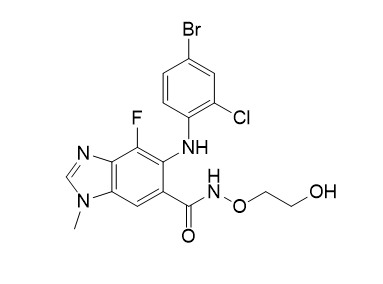Selumetinib (AZD6244)
Selumetinib (AZD6244, ARRY-142886) is a potent, highly selective MEK inhibitor with IC50 of 14 nM for MEK1 and Kd value of 530 nM for MEK2. It also inhibits ERK1/2 phosphorylation with IC50 of 10 nM, no inhibition to p38α, MKK6, EGFR, ErbB2, ERK2, B-Raf, etc. Selumetinib suppresses cell proliferation, migration and trigger apoptosis.
Inquire / Order:
manager@chemfaces.com
Technical Inquiries:
service@chemfaces.com
Tel:
+86-27-84237783
Fax:
+86-27-84254680
Address:
1 Building, No. 83, CheCheng Rd., Wuhan Economic and Technological Development Zone, Wuhan, Hubei 430056, PRC
Providing storage is as stated on the product vial and the vial is kept tightly sealed, the product can be stored for up to
24 months(2-8C).
Wherever possible, you should prepare and use solutions on the same day. However, if you need to make up stock solutions in advance, we recommend that you store the solution as aliquots in tightly sealed vials at -20C. Generally, these will be useable for up to two weeks. Before use, and prior to opening the vial we recommend that you allow your product to equilibrate to room temperature for at least 1 hour.
Need more advice on solubility, usage and handling? Please email to: service@chemfaces.com
The packaging of the product may have turned upside down during transportation, resulting in the natural compounds adhering to the neck or cap of the vial. take the vial out of its packaging and gently shake to let the compounds fall to the bottom of the vial. for liquid products, centrifuge at 200-500 RPM to gather the liquid at the bottom of the vial. try to avoid loss or contamination during handling.
Applied Biological Chem. 2020, 26(63).
Inflammation.2022, 45(6):2529-2543.
J Med Food.2022, 25(3):272-280.
Oncotarget.2017, 9(3):4161-4172
Animals (Basel).2024, 14(20):2990.
Appl. Sci. 2021, 11(10),4666.
Journal of Phytopathology2021, 169,Issue11-12.
Int J Mol Sci.2019, 20(16):E4015
Cell Physiol Biochem.2017, 44(4):1381-1395
Front Endocrinol (Lausanne).2020, 11:568436.
Related and Featured Products
Mol Cancer Ther,2010 Jul;9(7):1985-94.
Identification of common predictive markers of in vitro response to the Mek inhibitor selumetinib (AZD6244; ARRY-142886) in human breast cancer and non-small cell lung cancer cell lines.[Pubmed:
20587667]
Selumetinib (AZD6244; ARRY-142886) is a tight-binding, uncompetitive inhibitor of mitogen-activated protein kinase kinases (MEK) 1 and 2 currently in clinical development.
METHODS AND RESULTS:
We evaluated the effects of selumetinib in 31 human breast cancer cell lines and 43 human non-small cell lung cancer (NSCLC) cell lines to identify characteristics correlating with in vitro sensitivity to MEK inhibition. IC(50) <1 micromol/L (considered sensitive) was seen in 5 of 31 breast cancer cell lines and 15 of 43 NSCLC cell lines, with a correlation between sensitivity and raf mutations in breast cancer cell lines (P = 0.022) and ras mutations in NSCLC cell lines (P = 0.045). Evaluation of 27 of the NSCLC cell lines with Western blots showed no clear association between MEK and phosphoinositide 3-kinase pathway activation and sensitivity to MEK inhibition. Baseline gene expression profiles were generated for each cell line using Agilent gene expression arrays to identify additional predictive markers. Genes associated with differential sensitivity to selumetinib were seen in both histologies, including a small number of genes in which differential expression was common to both histologies.
CONCLUSIONS:
In total, these results suggest that clinical trials of selumetinib in breast cancer and NSCLC might select patients whose tumors harbor raf and ras mutations, respectively.
Clin Cancer Res,2007 Mar 1;13(5):1576-83.
Biological characterization of ARRY-142886 (AZD6244), a potent, highly selective mitogen-activated protein kinase kinase 1/2 inhibitor.[Pubmed:
17332304]
The Ras-Raf-mitogen-activated protein kinase kinase (MEK) pathway is overactive in many human cancers and is thus a target for novel therapeutics. We have developed a highly potent and selective inhibitor of MEK1/2. The purpose of these studies has been to show the biological efficacy of ARRY-142886 (AZD6244) in enzymatic, cellular, and animal models.
METHODS AND RESULTS:
The ability of ARRY-142886 to inhibit purified MEK1 as well as other kinases was evaluated. Its effects on extracellular signal-regulated kinase (ERK) phosphorylation and proliferation in several cell lines were also determined. Finally, the inhibitor was tested in HT-29 (colorectal) and BxPC3 (pancreatic) xenograft tumor models.The IC(50) of ARRY-142886 was determined to be 14 nmol/L against purified MEK1. This activity is not competitive with ATP, which is consistent with the high specificity of compound for MEK1/2. Basal and epidermal growth factor-induced ERK1/2 phosphorylation was inhibited in several cell lines as well as 12-O-tetradecanoylphorbol-13-acetate-induced ERK1/2 phosphorylation in isolated peripheral blood mononuclear cells. Treatment with ARRY-142886 resulted in the growth inhibition of several cell lines containing B-Raf and Ras mutations but had no effect on a normal fibroblast cell line. When dosed orally, ARRY-142886 was capable of inhibiting both ERK1/2 phosphorylation and growth of HT-29 xenograft tumors in nude mice. Tumor regressions were also seen in a BxPC3 xenograft model. In addition, tumors remained responsive to growth inhibition after a 7-day dosing holiday.
CONCLUSIONS:
ARRY-142886 is a potent and selective MEK1/2 inhibitor that is highly active in both in vitro and in vivo tumor models. This compound is currently being investigated in clinical studies.
Mol Cancer Ther,2007 Jan;6(1):138-46.
Targeted inhibition of the extracellular signal-regulated kinase kinase pathway with AZD6244 (ARRY-142886) in the treatment of hepatocellular carcinoma.[Pubmed:
17237274]
Cell lines: Primary HCC cell lines including 2-1318, 4-1318 and 26-1004 cells
Concentrations: ~ 10 μM
Incubation Time: 24 or 48 hours
Method:
Cells are seeded at a density of 2.0 × 104. After 48 hours incubation, the cells are rinsed twice with culture media. Cells are treated with various concentrations of AZD6244 for 24 or 48 hours. Cell viability is determined by the 3-(4,5-dimethylthiazol-2y1)-2,5-diphenyltetrazolium bromide (MTT) assay. Cell proliferation is assayed using a bromodeoxyuridine kit.



